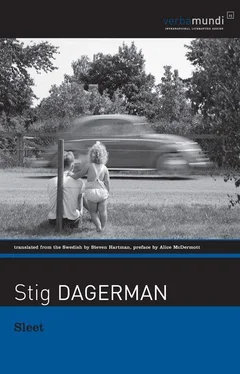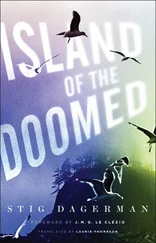At some point we were all in the outer hall again, where it was cold. I felt an incredible sense of relief to be free of that sofa in one piece, to be liberated from that foreign body. The cold was restoring some of my vitality. And while I was putting on my coat a thought struck me: the whole time we were in there with him Lind hadn’t said a word to us.
It can’t end this way, I thought. I could sense him standing in the doorframe behind me, but I didn’t dare look that way. I could only manage to squeeze out a thought: that I couldn’t afford to lose him, that none of us could afford that. And then I imagined a way out. The answer was to get him out of his hole. It was my turn to liberate him. But to say something to him was out of the question. Words were just a web that I continually got tangled up in.
I had to move quickly, because Ekman had already opened the door and was waiting for me to follow him out. That’s probably what Lind was expecting too. To the great surprise of all of us I went on the offensive, stepping suddenly forward and taking Lind’s hand in mine, as if snapping it in a hungry beak. He’d have to be blind not to see how desperate I was for his forgiveness, for a chance to shake free of the guilt he’d burdened me with.
But he was blind, and that’s what was so excruciating. His eyes didn’t see me and his hand just sat there in my own, unresponsive, like a heavy stone. I could sense his blindness, and so much more, like how he reviled me for the guilt I bore. The hopelessness of the whole situation made me numb, and so I escaped through the open door, which slammed closed behind me.
Ekman meanwhile had pushed the button for the elevator, and it came gliding up like an animal trapped behind an ironwork fence. The light was on inside the elevator, with all its mirrors, but that didn’t matter anymore. It was better that way, just as it should be. It would be pointless and stupid to try and resist the facts. As the elevator went down, Ekman and I stood back in our own corners, as far from the other as possible. And the whole time Ekman was working up the courage to say something. When the elevator finally reached the ground floor he managed to spit it out:
“Must be he did see the chess set after all,” he said.
I just couldn’t take it anymore. Grabbing hold of his shoulders, I shook him like you would an apple tree. His eyes sank in and all the blood drained from his face like a corpse. I must have shaken loose something inside him, because all the life just seemed to run out of him. All that remained were the hopeless dread of an animal and the ruins of a face, of a friend’s face. I didn’t have the strength to bear it. I had to get outside, out in the snow.
But I didn’t go far. I stopped outside a little grocery store just a ways up the road and waited for Ekman to come out of Lind’s building. When he finally did I followed after him. It was extremely difficult to see him at times through the sheets of swirling snow but I placed my own steps in his footprints. I couldn’t bear to lose everything in one night. After a little while I began to call out his name, but he never stopped to wait for me. We just kept walking, on and on, two trains locked into the same tracks. It wouldn’t be possible to meet without colliding. There were people and voices around us in the snow, but we were still alone in the city, in all cities. As we got closer to his building, we both picked up our pace. But he must have seen someone preparing to come out through the entrance before I did, and so he managed to dart in suddenly past the door as it closed. I was stuck outside, and the entrance was locked for the night.
I walked up the front steps anyway and peered in through the window in the door. It was dark inside the entranceway so I didn’t see him at first. But when my eyes adjusted well enough to spot him, I could see that he was very near me, but with his back turned towards me. I got the impression that he was standing there in the dark, crying. But maybe that was because I felt like crying myself. The wind and swirling snow forced me right up against the glass. Inside he must have sensed my presence, because he turned around abruptly and faced me. And right then I felt like running, but I wasn’t able to. For an awfully long time we stood there facing each other, and there was a great deal more than just a pane of glass separating us.
I could see that he understood. We both understood. We would have a difficult time ahead of us, and it would be a long time before we could look each other in the eye again. And that barrier would always be there, far thicker than any glass. And each of us would carry around our own guilt. It would be our only friend for the rest of that winter.
Without my realizing it at first, the door pushed open just a little crack. Suddenly something was touching my frozen hand. I grabbed hold of it and then the door closed again with a dull thud. Ekman disappeared into the darkness, and I was alone now. I turned and trudged on heavy legs out into the whirling snow. Without even looking at it, I opened the pocket chess set as I made my way down the long street of Hornsgatan. And each time I passed a lamppost I let a piece fall into the snow. And with each piece that fell, I grew lonelier, because in that snow I was burying not only friends but warmth and flowers and music and the promises of summer, all the things that help a young person to endure.
At the top of Katarinavägen, under the last lamppost on the street, the wind took the final black rook from my hand and carried it down over the harbor at Stadsgårn. The sky must have cleared a bit by then, because far below me, down at the water’s edge, I recall that I could make out the black smokestacks of some boats swallowing the snow. And that’s when I cocked my arm and threw the case down into the depths of that scene. The wind caught it, and with the driven snow it sailed off toward Slussen. And then the bells began to toll around the city, ten or eleven or something.
I walked home knowing what it was like to lose everything, even a set of pocket chess. But what it might be like to win everything, now that was something I couldn’t yet begin to fathom.
Where’s My Icelandic Sweater?
Well, what do you know? So I see I get the treatment today. Can see that as soon as we pull into the station. Greeted like a town worthy! Ulrik, he’s waiting by the station house in his greased-leather boots and best hat — the one with the widest brim — looking out over the tracks in his usual gloomy way. The grieving band and black bow tie just complete the picture as the horse leans down behind him and grazes in the flower bed. So I get to ride in the buggy, do I? That’s something I haven’t done since I was a kid. Guess I really am getting the full treatment, all on account of the old man dying. Otherwise I’d be hoofing it out to the farm like always, no matter if the mud’s so deep it swallows your feet whole. The only exception being Mamma’s funeral, of course.
That’s good old Ulrik for you! Can’t come over and meet you climbing down off the train, even if he sees you got your arms full with a wreath and a satchel full of brännvin . Suppose I could have sent the wreath on ahead of me, but you can never be sure how that’ll turn out. Look what happened to Mamma’s wreath, for Christ’s sake! Goddamn railway folks made such a mess of that there wasn’t any way to set it straight before the funeral. My goddamn eyes got shamed right out of their sockets, I’ll tell you that — me stuck there fussing around with the ribbons just before the service to try and hide the wreck of all them mutilated flowers. Not like it would’ve done me a damn bit of good to take it up with the railway folks. All them bastards do is pass the buck right back to you and leave you standing there like a clod.
Читать дальше












